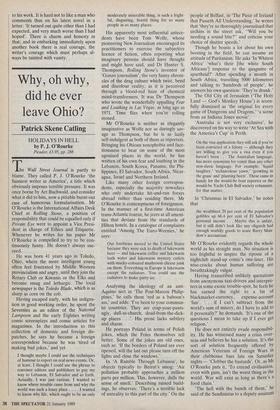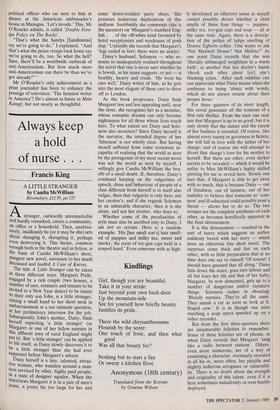Why, oh why, did he ever leave Ohio?
Patrick Skene Catling
HOLIDAYS IN HELL by P.. J. O'Rourke
Picador, £3.95, pp. 288
rEe Wall Street Journal is partly to blame. They called P. J. O'Rourke 'the funniest writer in America', a title which obviously imposes terrible pressure. It was once borne by Art Buchwald, and consider what it did to him, now a pitiable burnt-out case of humorous formularisation. Mr O'Rourke is the International Affairs Desk Chief at Rolling Stone, a position of responsibility that could be equalled only if Private Eye were to appoint a Vice Presi- dent in charge of Ethics and Etiquette. Whenever he writes for his paper Mr O'Rourke is compelled to try to be con- tinuously funny. He doesn't always suc- ceed.
He was born 41 years ago in Toledo, Ohio, where the more intelligent young often feel frustrated by Middle Western provincialism and angry, until they join the Rotary Club or Kiwanis or the Elks and become smug and lethargic. The local newspaper is the Toledo Blade, which is as sharp as corn on the cob.
Having escaped early, with his indigna- tion in good working order, he spent the Seventies as an editor of the National Lampoon and the early Eighties writing comic screenplays and comic articles for magazines. In the introduction to this collection of domestic and foreign dis- patches, he says he became a foreign correspondent because he was 'tired of making bad jokes,' and yet I thought maybe I could use the techniques of humour to report on real news events. Or, at least, I thought I could use the phrase to convince editors and publishers to pay my way to Lebanon, El Salvador and so forth. Actually, I was just curious. I wanted to know where trouble came from and why the world was such a lousy place . . . . I wanted to know why life, which ought to be an only
moderately miserable thing, is such a fright- ful, disgusting, horrid thing for so many people in so many places.
His apparently most influential antece- dents have been Tom Wolfe, whose pioneering New Journalism encouraged its practitioners to exercise the subjective licence of fiction, often reporting what imaginary persons should have thought and might have said, and Dr Hunter S. Thompson, Rolling Stone's inventor of `Gonzo journalism', the very funny chroni- cles of the drug culture which twist, bend and discolour reality, as it is perceived through a blood-red haze of chemical mind-transformers. It was Dr Thompson who wrote the wonderfully appalling Fear and Loathing in Las Vegas, as long ago as 1971. Time flies when you're rolling stoned.
Mr O'Rourke is neither as elegantly imaginative as Wolfe nor as daringly sav- age as Thompson, but he is as lazily self-indulgent as both of them as reporters. Bringing his Ohioan xenophobia and face- tiousness to bear on some of the most agonised places in the world, he has written of his own fear and loathing in the Lebanon, South Korea, Panama, the Phi- lippines, El Salvador, South Africa, Nicar- agua, Israel and Northern Ireland.
Like many other foreign correspon- dents, especially the majority nowadays who only undertake hit-and-run forays abroad rather than residing there, Mr O'Rourke is contemptuous of foreignness. In the manner of a first-time American trans-Atlantic tourist, he jeers at all ameni- ties that deviate from the standards of Hilton hotels. In a catalogue of complaints entitled 'Among The Euro-Weenies,' he
says: Our forebears moved to the United States because they were sick to death of lukewarm beer — and lukewarm coffee and lukewarm bath water and lukewarm mystery cutlets with mucky-coloured mushroom cheese junk on them. Everything in Europe is lukewarm except the radiators. You could use the radiators to make party ice.
Analysing the ideology of an anti- Aquino sect in 'The Post-Marcos Philip- pines,' he calls them 'red as a baboon's ass,' and adds: 'I've been to your commun- ist countries. They are crap-your-pants- ugly, dull-as-church, dead-from-the-dick- up places. . .'. His prose lacks subtlety and charm.
He portrays Poland in terms of Polish jokes, which the Poles themselves tell better. Some of the jokes are old ones, such as: 'If the borders of Poland are ever opened, will the last out please turn off the lights and close the windows.'
In 'A Ramble Through Lebanon', he objects typically to Beirut's smog: 'Air pollution probably approaches a million parts per million. This, however, dulls the sense of smell.' Describing ruined build- ings, he observes: 'There's a terrible lack of unreality to this part of the city.' On the people of Belfast, in 'The Piece of Ireland that Passeth All Understanding,' he writes that 'they're so thoroughly journalised that urchins in the street ask, "Will you be needing a sound bite?" and criticise your choice of shutter speeds.'
Though he boasts a lot about his own boozing in the field, he can assume an attitude of Puritanism. He asks 'In Whitest Africa' what's their [the white South Africans] response to the quagmire of apartheid?' After spending a month in South Africa, travelling 5000 kilometres and talking to 'hundreds of people', he answers his own question: 'They're drunk.'
The Old City of Jerusalem (`The Holy Land — God's Monkey House') is scorn- fully dismissed as 'the original for every game of Dungeons and Dragons,' a scene from an Indiana Jones movie'.
'Australia is not very exclusive', he discovered on his way to write 'At Sea with the America's Cup' in Perth.
On the visa application they still ask if you've been convicted of a felony — although they are willing to give you a visa even if you haven't been . . . The Australian language, has more synonyms for vomit than any other non-slavic language. For example: 'liquid laughter,' technicolour yawn,' growling in the grass' and 'planting beets'. These came in handy for the would-be boat reporter or the would-be Yacht Club Ball society columnist, for that matter.
In 'Christmas in El Salvador,' he notes that
the wealthiest 20 per cent of the population gobbles up 66.4 per cent of El Salvador's personal income . . Maybe this is unfair, but it still didn't look like any oligarch had enough worldly goods to scare Barry Man- ilow's accountant.
Mr O'Rourke evidently regards the whole world as his straight man. No situation is too frightful to inspire the riposte of a nightclub stand-up comic's one-liner. His wise-cracks about human suffering are breathtakingly vulgar. Having transcribed unlikely quotations from anonymous taxi-drivers and interpre- ters in some exotic trouble-spot, he feels he has earned the right to a bit of blackmarket-currency, expense-account 'fun'. `. . . if I can't subtract from the world's sum of misery, do I have to add to it personally?' he demands. 'It's one of the questions I mean to take up if I ever get religion.'
He does not entirely evade responsibil- ity. He has witnessed many a crisis over- seas and believes he has a solution. It's the sort of solution frequently offered by American Veterans of Foreign Wars in their clubhouse bars late on Saturday nights — 'Clobber the bastards'. Or, as Mr O'Rourke puts it, 'To extend civilisation, even with guns, isn't the worst thing in the world. War will exist as long as there's a food chain.'
The hell with the bunch of them,' he said of the Sandinistas to a deputy assistant political officer who sat next to him at dinner at the American ambassador's house in Managua. 'Let's invade.' This, Mr O'Rourke admits, is called 'Double Fore- ign Policy on The Rocks'.
"That's what the Sandys [Sandinistas] say we're going to do," I explained. "And that's what the peace creeps back home say we're going to do, too. So what the hell? Sure, there'll be a worldwide outbreak of anti-Americanism. But how much more anti-Americanism can there be than we've got already?" ' Mr O'Rourke's only achievement as a print journalist has been to enhance the prestige of television. `The funniest writer In America'? He's almost as funny as Mein Kampf, but not nearly as thoughtful.



























































 Previous page
Previous page